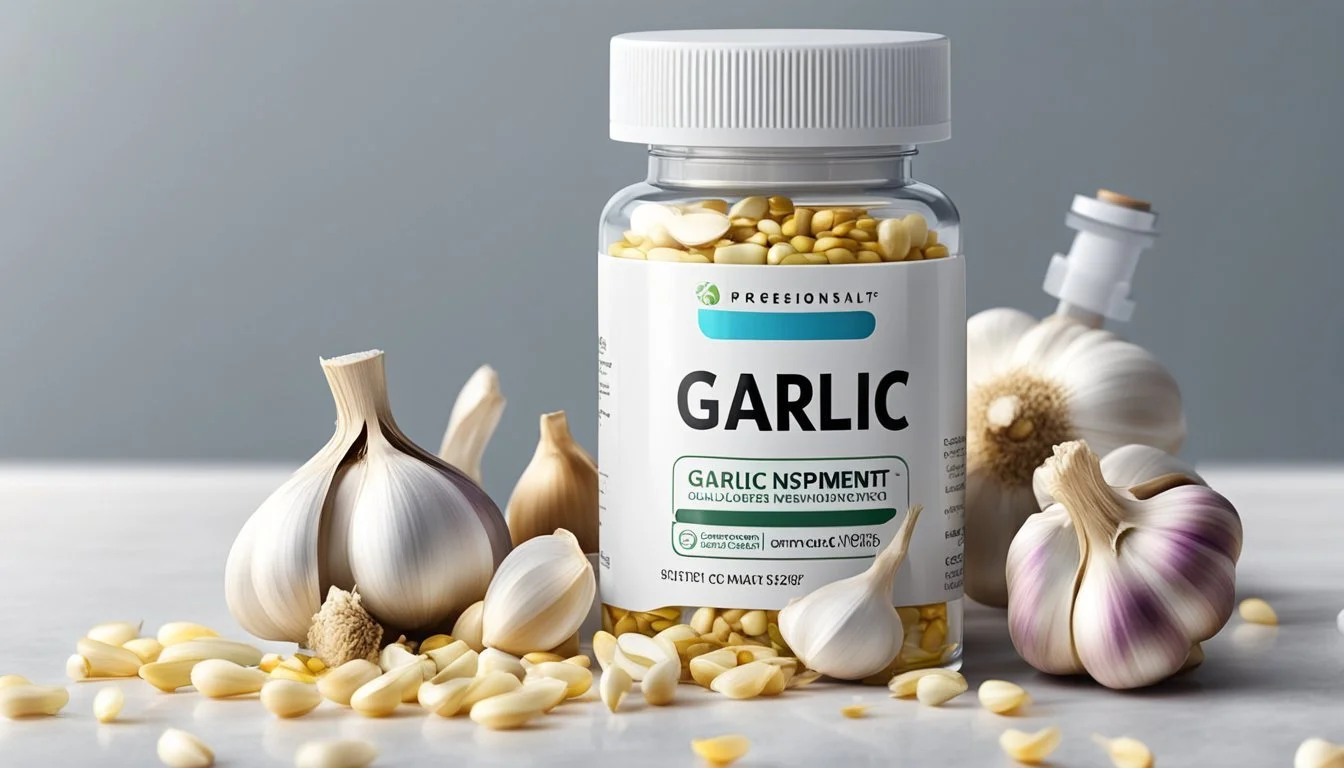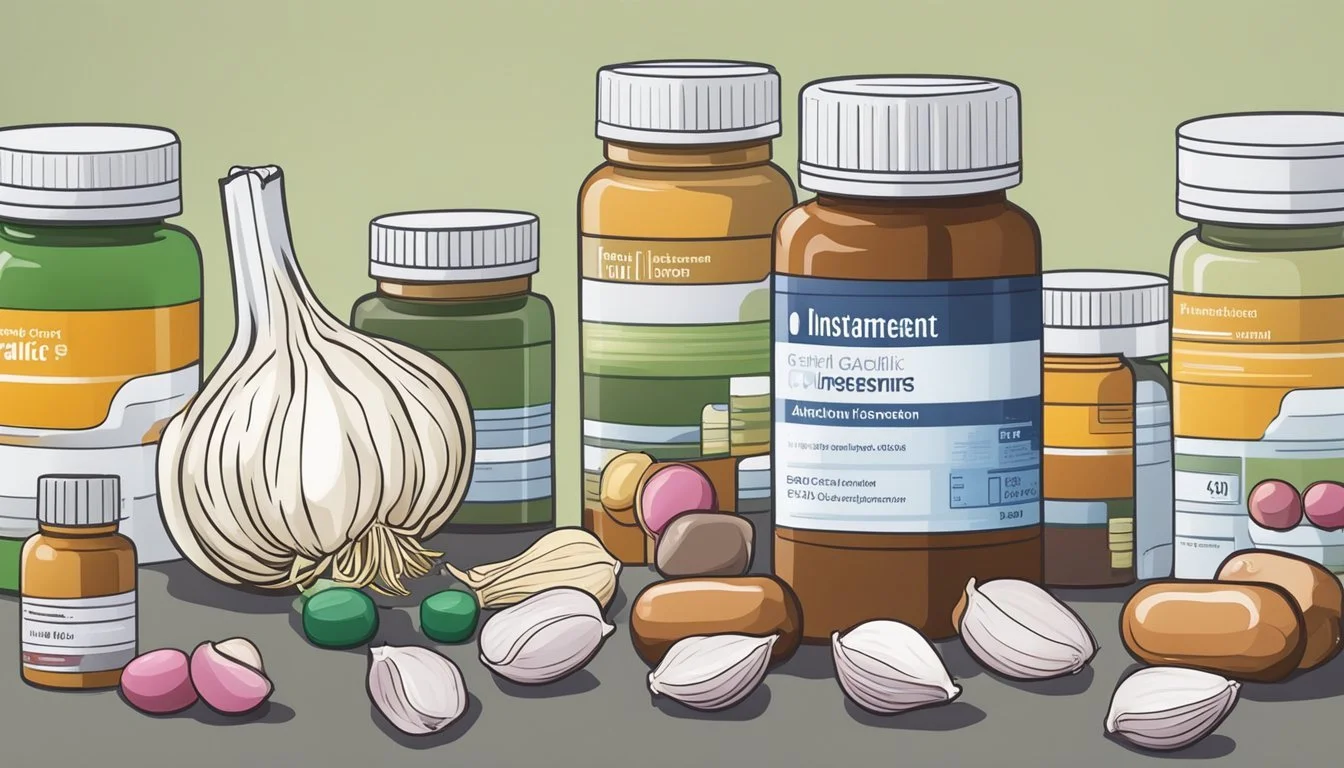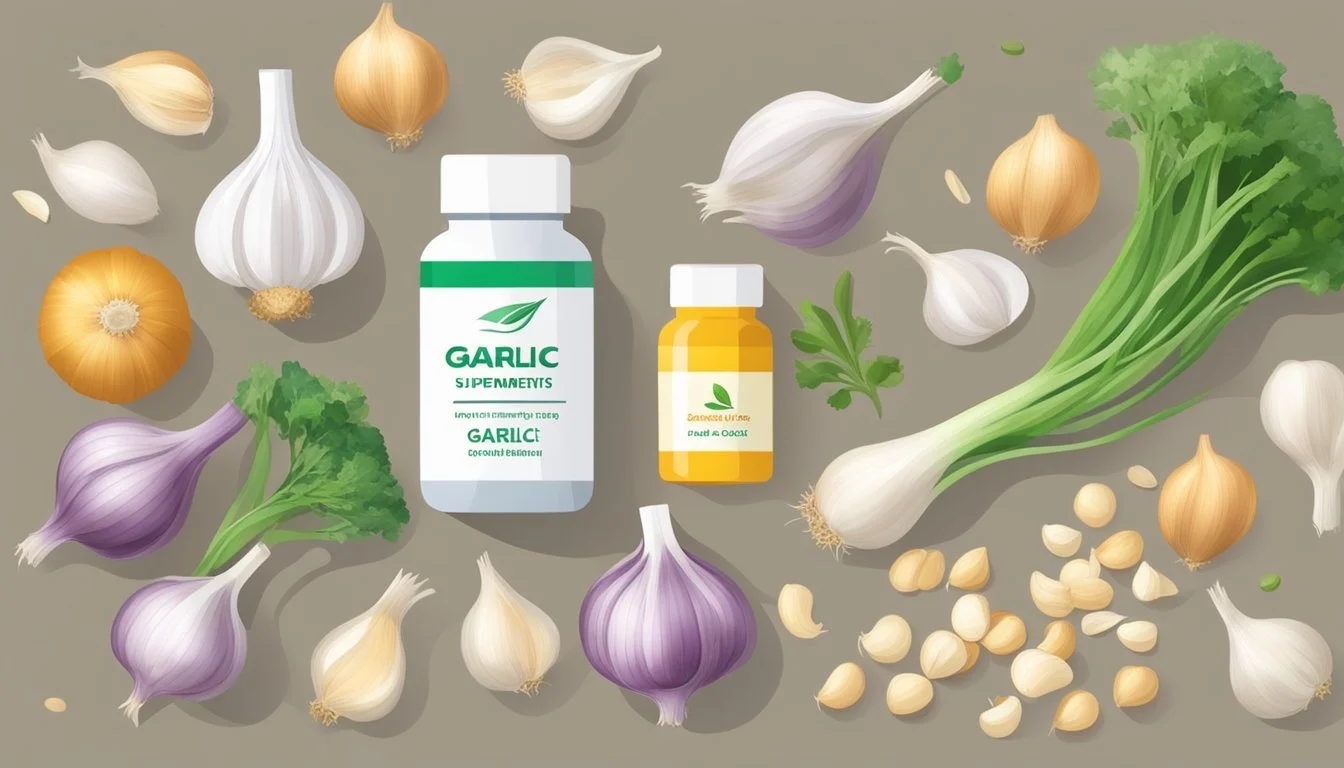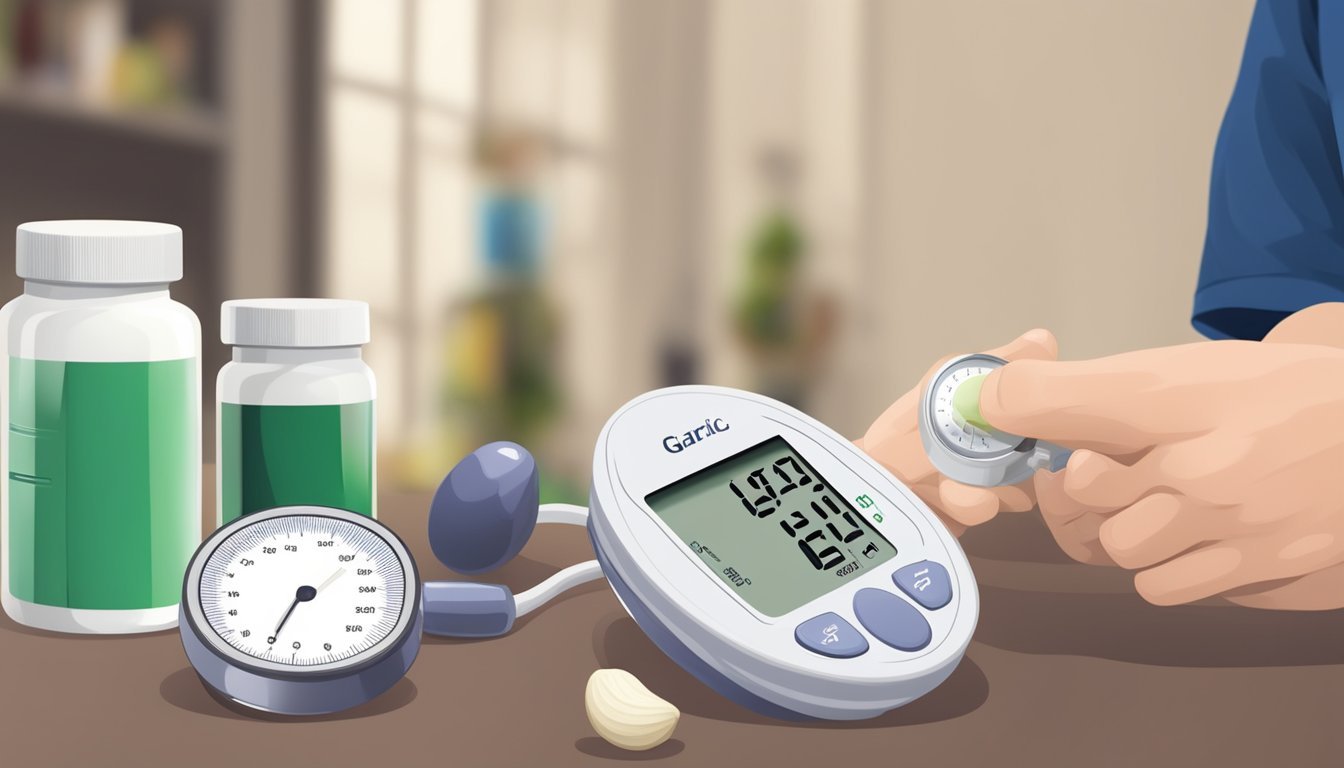Can Consuming Garlic Supplements Lower Blood Pressure
Unpacking the Evidence
Garlic (What wine goes well with garlic?) has long been recognized for its potential health benefits, including its ability to impact cardiovascular health. Research has indicated that garlic supplements may play a role in lowering blood pressure, which is a significant concern given that high blood pressure is a known risk factor for heart disease and stroke. Supplements are available in various forms, including raw garlic, garlic powder, aged garlic extracts, and garlic oil.
The active compounds in garlic, such as allicin, have been found to potentially aid in blood pressure reduction. These compounds work by dilating blood vessels, thereby improving blood flow and reducing pressure on the arterial walls. Clinical trials and meta-analyses have pointed towards the effectiveness of garlic supplements in managing hypertension, and in some cases, they have been compared favorably to standard anti-hypertensive medications. However, the degree of effectiveness can differ based on the form and dosage of the garlic supplement.
While there is promising evidence, the overall consensus in the medical community is not without caution. Not all studies found consistent results, and the long-term effectiveness of garlic for blood pressure management remains under investigation. Medical professionals emphasize that, even with the potential benefits, garlic supplements should not replace prescribed treatments, but may complement them when used under the guidance of a healthcare provider.
Understanding Blood Pressure
In the discussion of cardiovascular health, blood pressure is a crucial metric. It provides insights into the force exerted by blood against arterial walls and is instrumental in diagnosing hypertension, a condition linked to increased risks of heart disease and stroke.
Defining High Blood Pressure
Hypertension, commonly referred to as high blood pressure, is defined by two key measurements:
Systolic blood pressure: This is the higher number indicating the pressure in arteries when the heart beats.
Diastolic blood pressure: This is the lower number representing the pressure in arteries between heartbeats.
The typical threshold for hypertension is a systolic blood pressure greater than 130 mmHg, or a diastolic pressure over 80 mmHg.
Effects on Health
Elevated blood pressure can lead to serious health complications, including but not limited to:
Heart Disease: Persistent hypertension puts one at greater risk of developing heart diseases such as heart failure or coronary artery disease.
Stroke: High blood pressure can cause blood vessels in the brain to clog or burst, leading to a stroke.
Death: Uncontrolled hypertension is a significant risk factor for premature death, often due to complications like heart disease and stroke.
Garlic's Medicinal Properties
Garlic, scientifically known as Allium sativum, has been widely recognized for its medicinal properties, particularly for cardiovascular health. This section explores the bioactive components in garlic that contribute to its health benefits.
Allicin and Its Effects
Allicin is the main active compound found in garlic. Upon crushing or chewing raw garlic, the enzyme alliinase converts alliin into allicin, which is responsible for garlic's distinctive aroma and many of its health benefits. Research suggests that allicin may help lower blood pressure through various mechanisms, such as vasodilation, which improves blood flow. Allicin is also noted for its anti-inflammatory properties, potentially beneficial in reducing the risk of cardiovascular diseases.
Garlic's Antioxidant Properties
Garlic contains antioxidants that protect against oxidative stress, a factor implicated in high blood pressure and the progression of cardiovascular disorders. These antioxidants neutralize harmful free radicals, which can damage cells and exacerbate heart conditions. The presence of these compounds makes garlic a multifaceted agent with potential therapeutic effects, not only for hypertension but also in bolstering the immune system and offering some level of protection against various diseases.
Garlic Supplements and Blood Pressure
Garlic supplements are often discussed as a natural alternative for managing blood pressure. The following sections detail the existing research and compare the various garlic forms available for supplementation.
Evidence from Scientific Studies
Meta-analysis studies provide the most comprehensive evidence regarding garlic supplements and their effect on blood pressure. Notably, a meta-analysis examining over 900 participants concluded a significant effect of garlic on blood pressure. Hypertensive subjects observed an average decrease of 8.6 mmHg in systolic blood pressure (SBP) and 6.1 mmHg in diastolic blood pressure (DBP). These results suggest that garlic supplements can be beneficial for those with high blood pressure.
Comparing Different Forms of Garlic
Garlic supplements are available in various forms, including raw garlic, garlic powder, aged garlic extracts, and garlic oil. Each form has a different dosage and duration as follows:
Raw garlic: Consumed in food or as a supplement, it usually requires a dose equivalent to one or two cloves per day.
Garlic powder: Dosages typically range between 600 to 900 mg per day.
Aged garlic extracts (Kyolic garlic): Studies have used doses from 600 to 2,400 mg per day. Aged garlic is known for its reduced odor and potentially more stable beneficial compounds.
Garlic oil: Data on dosages for blood pressure management is less definitive, but garlic oil supplements are generally used in smaller quantities due to their concentration.
Each form has shown potential in lowering blood pressure, but dosage and preparation can vary widely, impacting their effectiveness.
Optimal Dosage and Administration
When considering garlic supplements for blood pressure management, precise dosage and timing are crucial factors that can influence effectiveness. Adhering to recommended amounts and consuming supplements at optimal times can facilitate the best outcomes.
How Much to Take
The effective dosage of garlic supplements can vary based on the form and preparation, with common dosages ranging from 12.3 to 2,400 mg per day. Clinical trials suggest that these doses, administered for periods ranging from 2 to 24 weeks, are associated with reductions in blood pressure levels, often comparable to standard antihypertensive medications.
Aged Garlic Extract: Typically used at a dose of 600 to 1,200 mg per day.
Garlic Powder: A common effective dosage is approximately 400 to 800 mg per day.
Garlic Oil: Potency varies, but a general guideline is around 1 to 2 mg per day.
It is essential to note that garlic's potential to produce hydrogen sulfide, a compound that may contribute to its vasodilatory effects, is likely impacted by dose and form of the garlic consumed. However, the direct role of hydrogen sulfide in garlic's impact on blood pressure requires further study.
Best Times for Consumption
The timing of garlic supplement intake can affect nutrition absorption and possibly its efficacy. Although specific research into the optimal time for consumption is limited, a consistent approach, such as consuming supplements with meals, can improve tolerability and ensure sustained release throughout the day.
With Meals: Taking garlic supplements with food may reduce gastric discomfort and optimize absorption.
Consistent Schedule: To maintain steady levels of the supplement in the body, consumers should take garlic at the same times each day.
Consumers should follow the manufacturer's instructions or consult a healthcare provider for personalized advice, especially when managing blood pressure, to determine the best dosage and administration schedule.
Potential Side Effects and Interactions
While garlic supplements are commonly consumed for their health benefits, notably in lowering blood pressure, they may come with potential side effects and interactions. It is important to consider these before starting a garlic supplement regimen.
Common Side Effects
Garlic supplements, although generally safe, can cause side effects in some individuals. The most common side effects of garlic include:
Gastrointestinal issues: Some people may experience digestive discomfort, such as gas, bloating, or an upset stomach.
Odor: Garlic supplements can cause a noticeable garlic odor on the breath and sweat.
Interactions with Medications
Garlic supplements have the potential to interact with certain medications, and these interactions can sometimes be serious. Specific known interactions include:
Blood thinners: Garlic may amplify the effects of anticoagulant or antiplatelet medications, such as warfarin, increasing the risk of bleeding.
Medications metabolized by the liver: Garlic supplements can affect how the body processes certain drugs, thereby impacting their overall efficacy.
Patients are advised to consult with a healthcare provider before incorporating garlic supplements into their health regimen, especially if they are on medication.
Considerations for Specific Populations
When considering garlic supplements for blood pressure management, specific populations such as pregnant or breastfeeding women and individuals on blood-thinning medications must approach this option with caution. It is essential they consult a healthcare provider to weigh the potential benefits against any possible risks.
Pregnant or Breastfeeding Women
Pregnant women should be particularly cautious with garlic supplements as they could affect blood clotting or potentially stimulate the uterus. Breastfeeding women are advised to be similarly cautious, as compounds from garlic may be transferred to the infant through breast milk, and the effects on the infant are not well understood.
Individuals on Blood-Thinning Medications
Those on blood-thinning medications should consider the interaction between garlic supplements and their medication. Garlic has known antiplatelet properties, which can potentiate the effects of blood-thinners, increasing the risk of bleeding. Therefore,:
Consultation with a healthcare provider is crucial before starting garlic supplements.
Close monitoring of blood pressure and clotting status is recommended.
Individuals who are allergic to garlic should avoid garlic supplements entirely to prevent allergic reactions, which can range from mild to severe. Hypertensive patients considering garlic supplements are encouraged to discuss their condition and treatment options with their healthcare provider to tailor an appropriate regimen.
Synergistic Effects with Other Nutrients and Supplements
When considering garlic supplements for blood pressure management, one should assess their interactions with other nutrients and supplements to optimize their efficacy.
Complementary Supplements
Garlic's potential in lowering blood pressure may be enhanced when combined with certain supplements:
Vitamin B6 and B12: These vitamins are essential for overall cardiovascular health. They can aid in the reduction of homocysteine, a risk factor for heart disease, potentially amplifying garlic's benefits.
Coenzyme Q10 (CoQ10): As an antioxidant, CoQ10 might support garlic in endothelial function, further assisting in blood pressure control.
Potassium: This mineral helps relax blood vessel walls, which can complement the effects of garlic on blood pressure.
Influence of Diet on Garlic's Efficacy
Dietary choices impact the performance of garlic supplements in blood pressure management:
Probiotics: A diet rich in probiotics can improve gut health, which might affect the bioavailability and, consequently, the effectiveness of garlic supplements.
Sulfur-rich Foods: Garlic itself contains sulfur compounds. Consuming a diet with other sulfur-rich foods may enhance the compound's availability and activity within the body.
By understanding these interactions, individuals can make informed decisions about incorporating garlic supplements into their regimen for managing blood pressure.
Beyond Blood Pressure: Other Health Benefits of Garlic
While garlic is often recognized for its potential to manage blood pressure, it also confers a spectrum of other health benefits, particularly for cardiovascular health and immune system support.
Cardiovascular Health
Garlic's influence on heart health extends to managing cholesterol levels. Studies suggest that garlic consumption can have a beneficial effect on cholesterol, potentially leading to a reduction in both total and LDL (the "bad") cholesterol. This complements its blood pressure-lowering capabilities, culminating in a more comprehensive cardiovascular health strategy.
Immune System Support
Supporting the immune system, garlic exhibits notable antibacterial and antiviral properties. It provides a natural defense mechanism against various pathogens and may play a role in reducing the severity or frequency of some infections. Additionally, certain compounds in garlic are studied for their potential to reduce cancer risk through various mechanisms, including the promotion of apoptosis in cancerous cells.
Integrating Garlic Supplements Into a Healthy Lifestyle
Integrating garlic supplements as part of a comprehensive approach to health may contribute to lower blood pressure. This involves a balanced diet, regular exercise, and lifestyle modifications, such as quitting smoking and reducing alcohol intake.
Role of Exercise and Diet
Exercise plays a vital role in maintaining cardiovascular health. Regular physical activity helps to strengthen the heart, enabling it to pump blood more efficiently, which can lead to lower blood pressure. Exercising regularly is beneficial, with adults advised to aim for at least 150 minutes of moderate-intensity exercise per week.
In parallel, diet is integral to heart health. Including garlic in the diet or as a supplement could be advantageous due to its potential to help lower blood pressure. A balanced diet rich in fruits, vegetables, and whole grains is recommended. These foods can enhance the effect of garlic supplements on blood pressure, when combined with a generally healthy lifestyle.
Quitting Smoking and Limiting Alcohol Consumption
Smoking cessation is a critical lifestyle change for those looking to manage blood pressure. The harmful chemicals in tobacco can cause blood vessels to narrow, leading to increased blood pressure. Consequently, quitting smoking can help improve heart health and complement the potential blood pressure-lowering effects of garlic supplements.
Similarly, limiting alcohol consumption can aid in keeping blood pressure in check. Heavy and regular consumption of alcohol can have a negative impact on blood pressure, so moderation is key. Reducing alcohol to moderate levels — up to one drink per day for women and two drinks per day for men — can contribute positively to the management of blood pressure.
Summary and Final Recommendations
Research indicates that garlic supplements may play a role in reducing blood pressure for individuals with hypertension. A meta-analysis found an average decrease in systolic blood pressure by 8.6 mmHg and diastolic blood pressure by 6.1 mmHg, highlighting the potential of garlic in managing heart disease and reducing cardiovascular events.
Safety Considerations When considering garlic supplements:
Always consult a healthcare provider, especially if on blood pressure medication.
Garlic is generally safe but can interact with certain medications, like blood thinners.
Dosage
Effective dosages range from 12.3 to 2,400 mg per day.
Duration of supplementation varies from 2 to 24 weeks.
Responsiveness to garlic can vary by individual.
No Substitute for Standard Care
Garlic should complement, not replace, doctor-recommended treatments.
It is another tool in the arsenal against heart disease, not a stand-alone cure.
Placebo Effect
Some studies use placebos to measure the effectiveness of garlic against an inactive substance.
This establishes a more accurate understanding of garlic's impact on blood pressure.
In conclusion, garlic supplements show promise in lowering blood pressure as part of a comprehensive approach to cardiovascular health. They are not a cure-all and should be used with professional guidance to ensure safety and effectiveness.







